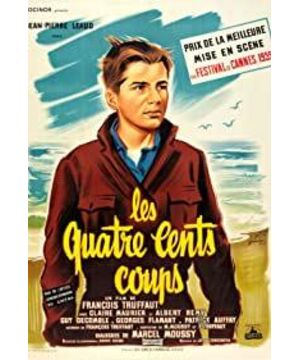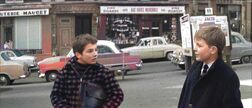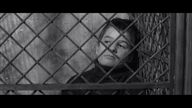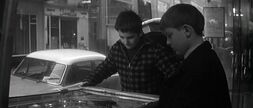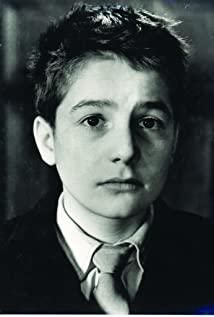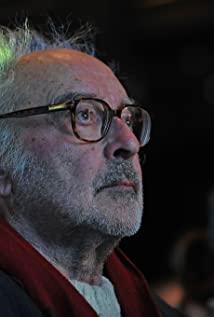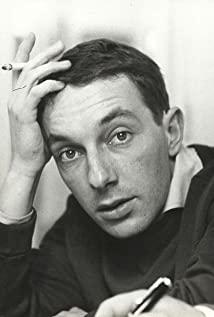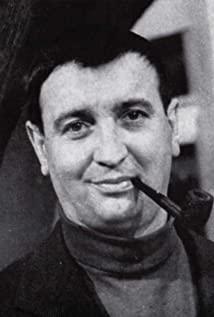The twentieth century is a revolutionary century in human history, and the two decades after World War II can be regarded as one of the most interesting periods. During this period of time, the world political situation was complicated and ever-changing, but various dazzling new trends of thought appeared in the literary, artistic and philosophical circles. French New Wave films were one of them.
After World War II, the emergence of youth spiritual crisis has become a common phenomenon in the western world. Under the impact of the war, traditional values disintegrated one after another, the disaster of fascism caused people to reflect on collectivism, and the rigid political system was facing crisis. France, which was hit hard by the war, is eager to restore its former glory. The old and new systems are constantly in conflict, and a series of policies to promote economic development have been implemented with reference to the British and American models. At the same time, a British and American-style materialist consumerism has emerged in the society, which is incompatible with the traditional The modern mood of the complete departure from the French value system was dangerous and incomprehensible to older theorists, but to young creators - be it literature, art or philosophy - this danger is precisely the harbinger of a new era, such as Rory Greer said, "The systematic repetition of the old system is not only absurd and futile, it may even be harmful: it ultimately prevents us from creating the world by obscuring our real situation in the real world. and the future of mankind". In such an environment, intellectuals are suspicious of traditional philosophical systems and try to explain the relationship between the world, society and individual life in new ways. They reject the existing social order and norms and emphasize individual choice. Nothingness and alienation seem to have become the spiritual characteristics of that era, "when history has driven him from one form of life to the next, from one consciousness of his own existence to another such consciousness, One can recall his transition from the previous stage to the current stage, but he seems to think that he cannot go any further on this path."
Under the influence of existentialism, the "new wave" films appeared in France. The starting point of this film movement was a series of theoretical storms set off by the magazine Cahiers du Cinéma founded by André Bazin, who proposed the ontology of film, the theory of film realism, and the theory of long shots, for the French New Wave film movement Provides a solid theoretical foundation. New wave filmmakers try to break away from the traditional habits of classic films and present life in a "natural flow" way. This is also one of the reasons why French New Wave films have great sociological research significance today.
Director Truffaut's debut film "The Four Hundred Blows" is the pioneering work of the New Wave film. Based on his own experience in his youth, he tells the story of a "problem boy" Antoine. The title of the film means "mischief" in French, and there is also a French proverb that says that a mischievous child needs four hundred beatings to get rid of disasters and demons and become an obedient child. The title "Four Hundred Strikes" already hints at the film's opposition to punishment and rebellion. Antoine is a thirteen-year-old boy who was left at home by his parents, punished by his teachers at school, and sent to a juvenile detention center for running away and stealing. The only warmth in his life comes from a friend at school, and their friendship is not recognized by the adult world. In the end, Antoine escaped from the juvenile detention center, only to find that he had nowhere to go.
In the film, Antoine is faced with a world of indifference and alienation, which is in line with the social atmosphere of post-war France, where the individual becomes the largest unit in society, and people fall into the "trap of private life", "their vision , their power is limited by the work, family, and neighborhood of the one-third of the acre.” As a child, Antoine was in such an environment, and he showed a stronger sense of alienation and insecurity. Only when he found out that his mother was cheating, did his mother change her former indifference to please him, and she was friendly to him. His father is not his biological father, and the teachers in the school do not recognize him. He seems to be a burden to the adult world, as Heidegger said, "an orphan who was thrown into the world". In the adult world that Antoine faced, not only caring was lacking, but also various constraints were imposed on him, so he chose a stance of resistance. This is the usual protagonist in New Wave movies, who are often "social outcasts, antiheroes, loners" who "act according to their intuition rather than their socially assigned roles." In the film, Antoine repeatedly mentioned that he wanted to see the sea from the beginning, and finally sent him to the juvenile detention center for stealing a typewriter to "have money to go to the beach to play". The "sea" here is obviously a metaphor for personal freedom. Antoine's truancy and running away from home are all his efforts to rebel against this indifferent and standardized world and try to pursue personal freedom. At the end of the film, Antoine escaped from the juvenile detention center and ran all the way. The long shot followed him all the way to the beach. Before the boundless water, Antoine turned his head in confusion, the picture freezes, and the film ends here. The freeze-frame shot of Antoine turning back at the end of the film is a classic scene in film history. When he finally reached the sea, his ideal "freedom", he found that there was nowhere to go. Antoine's last shot makes the film more absurd and nihilistic from the binary opposition of shackles and resistance, and it becomes thicker.
The absurd is an important element in existentialism, which arises from the suspicion brought about by the huge gap between the religious and spiritual life of the French tradition and the modern industrial society. "God is dead, but history lives on." When people found it difficult to balance the two sets of values, traditional and modern, they had to fall into nothingness and choose the pleasures of this world, but they were always accompanied by a sense of absurdity. "Everything is in turmoil. , are running towards nothingness, but those who are insulted are still persistent, at least maintaining pride." People in modern society become "absurd people", who "do nothing for eternity and do not deny eternity" and "love their courage and reasoning more than nostalgia". Antoine's bewildered expression in the last freeze frame of "The Four Hundred Blows" reflects what Camus said: "His freedom has come to an end, his resistance has no future, and his consciousness may die out." The thirteen-year-old boy His face conveyed the negative mood of the times in the entire Western world at that time.
This perspective of "imprisonment-rebellion" is based on the behavior of the protagonist Antoine in the film, and if we look at the reaction of the outside world to Antoine's behavior, we can draw the perspective of "deviance-punishment". The film begins with Antoine being punished by his teacher for standing up in class, and he is not alone in the situation at the time of deviance. In fact, every time Antoine is punished in the whole film is in a situation that is accidental and can even be called "bad luck". This "impermanence" can actually be regarded as a negative emotion. reflection. The places where Antoine was punished were the school in the first half of the film and the juvenile detention center in the second half. In fact, these two places have the characteristics of prisons, isolated from the outside world and collective life. The most important commonality that haunts schools, shelters, and prisons is "deviation from the norm, an anomaly," which "unifies in the realm of meaning and function what 'prison' unifies in the field of strategy". Those who were punished were considered "enemies of society" and "abnormalities", carrying "multiple dangers of disturbance, crime and madness". And this kind of "enemy of society" is the embodiment of "the enemy of the monarch" in modern society. The supreme authority has changed from the monarch, who is both an individual and a symbol, to an abstract social norm. Anyone who violates it will be punished. As a result, the prison network that played a disciplinary role continued to expand, and eventually became a grand mechanism, including a series of places related to public services and relief, such as schools, almshouses, and rehabilitation centers. All unstable factors in the training society that may violate the rules and become "enemies". The social environment in which Antoine lives, or the adult world he faces, is such a huge network of prisons, from the family, the school, the police station, and the juvenile detention center, all the time trying to teach him to obey the rules and keep him in the dark. Punish him for trying to disobey. Foucault calls such a system a "panoramic open society" in which individuals are "surrounded by mechanisms" from birth. In the office of the police station, Antoine was locked in a small cage that could only accommodate him. The camera started from his point of view and looked around the entire police station office through an iron fence. A metaphor for the open" prison system.
The formation of such a prison-structured social system needs to be traced from the historical tradition of France. Under the influence of the Catholic tradition, which emphasized community life and the leadership of authorities (priests, priests) in the community, France under the ancien régime focused on the unity of legislation, because when religious life was withdrawn from the secular world, the monarch and the The law becomes the supreme authority. The bourgeoisie and the nobility, although they hated each other, had many common interests and common affairs, and "the whole empire enforced the same rules and regulations in the same way", so people lived under these same rules and became more and more alike. These systems, which have played a role in dissolving the differences between people in different provinces and different classes, are the prototype of an invisible prison network that covers the whole society. And among these very similar groups, they are divided into small groups, and these small groups do not care about each other and only seek personal gain. The so-called collectivism and individualism are actually two sides of the same, and this national character of the French led to the formation of the fanatical revolution, and after the disillusionment of the revolution, individuals became more and more alienated from each other under the surface of collectivization, but They still insisted on the "equality of all" in the collective, and the transition from monarchy to democracy also made the requirement of "equality for all" more easily fulfilled by legal norms. "Each of them insists on their own special status, only because the others specialize because of their status; but as long as no one enjoys special, and does not exceed the common level, they are willing to merge into a whole."
On the one hand, this pursuit of collectivization and equality promotes the normalization of society, and on the other hand, it also reduces the tolerance of deviant behavior in society, so that the norms continue to strengthen until a “panoramic open society” with the nature of prison is formed. In the post-war cultural trend of thought, young people began to reflect on such norms and systems, which can also explain why the protagonists in New Wave films are often "social outcasts, anti-heroes, and loners" contrary to the classic film model. Under such a traditional system, the contradiction between the isolated individuals and the highly unified collective social norms makes the human situation heterogeneous. Obedience is a praised quality, but the value of obedience is in modern industry, war, and fascism. Under the lessons of the concentration camps, they lost a reliable foundation. As a result, young people doubt this whole system and values, and they reflect, "It is not the world that we get rid of loneliness, but the connection between such individual self and other individual self, the interconnection between self-existing individuals. constitutes an invisible essential existence".
Antoine's story embodies the story of an individual who has fallen into a situation of alienation and absurdity trying to resist and pursue freedom in a normalized and indifferent social environment. The punishment he receives does not come from his own mistakes, but from the institutional system he is in. We can even think that in such a normalized society with a panoramic prison style, everyone is born with original sin (sin). Yes, because everyone has the possibility of deviance. Corresponding to the transformation of the authority in the Catholic tradition from priests into social norms in modern society, the concept of original sin in the Catholic tradition is also manifested in a new way in modern society, in a world where all people "from the cradle to the grave" are in accordance with the rules. "Sin" is ubiquitous in a society that is tossing between places where teaching is the purpose.
This is what the young generation after World War II resisted, so we can see the lyrical portrayal of Antoine, a "problem boy" in the traditional sense. However, as mentioned above, the author reflects on the existing social norms and resists them, but also reflects on the resistance itself. Antoine's pursuit of freedom from beginning to end did not achieve a satisfactory result in the end, but gave A questionable ending - what should Antoine do after escaping the normalized social order? Did he really get the so-called "freedom"? This is the question that the film raises, and it is also the question that the generation of philosophers and artists pondered.
It can also be seen that although the youth of the New Wave generation have the courage to question authority and tradition, they are also questioning their own questioning and the new order they have created. Under the conflict between religious belief and modern technology, traditional ethics and modern order, young people question everything, negativity and rebellion have become the emotions of the times. After the blood of the Great Revolution has cooled for more than a hundred years, the French youth reconsider the words of resistance, which is engraved in their national memory. For them, resistance is not a means, but an end in itself. "I resist, therefore I am", "I" has become the most important figure in this era: if the concrete freedom from social norms is doomed to be lost, then the abstract freedom of individual will becomes the most important pursuit. After World War II, the new ideological trend of the French youth generation separated individualism from the two sides of collectivism as a new paragon of supreme value. At the same time, other Western countries are also experiencing various youth new ideological movements in literature and art. From the early 1950s to the late 1960s, this group of young people updated the Western spiritual world, the French New Wave film movement, Just a microcosm of it.
references:
Richard Newport, translated by Chen Qingyang, Shan Wanli School "The History of French New Wave Films" Jilin Publishing Group Co., Ltd.
Karl Jaspers, translated by Wang Defeng, "The Spirit of the Times" Shanghai Translation Publishing House
Michel Foucault, Liu Beicheng and Yang Yuanying translated Discipline and Punishment Life·Reading·Xinzhi Sanlian Publishing House
Tocqueville, Feng Tang's translation of "The Old System and the Great Revolution" Commercial Press
Albert Camus, translated by Shen Zhiming, The Myth of Sisyphus, Shanghai Translation Publishing House
C. Wright Mills, translated by Li Kang, "The Sociological Imagination" Beijing Normal University Press
View more about The 400 Blows reviews


